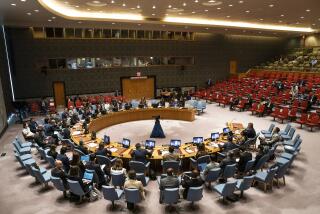Russia to Proceed With Yukos Sale
- Share via
MOSCOW — Russian authorities vowed Friday to press ahead with the auction of Yukos Oil Co. assets despite a U.S. court order. But banks showed signs of shying away from financing a deal that would break up Russia’s biggest oil exporter and put the company’s major production unit under state control.
Clearly irritated at the U.S. Bankruptcy Court’s last-minute intervention in the Kremlin’s long-running tax war with the Russian company, officials in Moscow asserted that the ruling had no legal force in their country.
A federal property fund spokesman said the auction Sunday would “go ahead as planned.”
“You must understand that we are talking about the auction of an arrested property, which will be sold in strict accordance with the decisions of the Justice Ministry,” said fund spokesman Alexander Komarov.
The decision Thursday by U.S. Bankruptcy Judge Letitia Clark “has nothing to do with us,” he said.
Clark’s decision barred Russia’s state-owned natural gas giant Gazprom, expected to be the leading bidder, from participating in the auction.
A Gazprom spokesman said the company still planned to take part but was vague on whether Western banks also named in the temporary restraining order would defy the court and put up the $10-billion credit line that Gazprom was seeking to finance the deal.
The upshot was a dramatic international standoff between the legal authorities of Russia and the U.S. over an oil company that accounts for the biggest share of Russian production and controls reserves the size of Libya’s.
Nearly two-thirds of Yukos’ production comes from its Siberian oil unit, Yuganskneftegaz, which exports 1 million barrels of oil a day and is slated for sale to relieve a Russian tax claim that has reached $27 billion.
“You take out Yuganskneftegaz, and you’ve ripped out the heart of the organization,” said Claire Davidson, a London-based Yukos spokeswoman. “If you’re all about destroying Yukos, Yuganskneftegaz is the first step.”
Yukos officials argued that U.S. courts had jurisdiction because of the company’s business interests in the United States and because Americans were among the investors hurt by the Russian government’s moves.
Russian officials responded with thinly disguised contempt to the order that followed Yukos’ petition in the U.S. for Chapter 11 bankruptcy protection from Russian tax authorities and other creditors.
“Yukos doesn’t have an office here. Yukos is not involved in any business activity here. The [bank] accounts which were presented here as opened in U.S. banks were opened only several days ago,” Nikolay Sofinskiy, the Russian consul general in Houston who attended the bankruptcy court hearing, said in a telephone interview.
“With all respect for the American legal system, the court in Houston simply doesn’t have the jurisdiction to pass decisions ... connected with actions of the Russian state toward its own problems,” he said.
However, analysts said Gazprom’s assets outside Russia could be vulnerable if the company defied the U.S. order.
The judge’s decree also prohibits a consortium of banks, led by Deutsche Bank, from financing any disposal of Yukos assets.
Bank officials did not comment, but Russian news agencies Interfax and Itar-Tass reported that the group had decided to freeze financing on the Yuganskneftegaz bid until after the U.S. court proceedings.
Still, Russian analysts said Gazprom could turn to banks in Asia or Russia -- or even to the Russian treasury -- to finance a deal the Kremlin clearly believed was in Russia’s interest.
The tax claims began last year, at the time of the arrest of former Yukos Chief Executive Mikhail Khodorkovsky.
The wealthy entrepreneur, now on trial on charges of fraud and tax evasion, financed political opposition parties and earned many allies in the U.S. with his effort to run Yukos as a model of liberal corporate transparency.
Yukos officials believe that the tax claims are an attempt to punish Khodorkovsky for his political activism and strip him of his fortune.
The company sought refuge in the U.S. Bankruptcy Court because the Russian court system lacks justice and independence, the officials said.
Clark’s order Thursday banning the Deutsche Bank-led consortium from participating pending a further review of the case in 10 days does not prevent other banks from stepping in, said Eric Kraus, chief strategist at Sovlink, a Russian investment company.
Yuganskneftegaz “is a very rich asset, and a lot of people would like to have a part of it,” he said, adding that the Russian government’s interest would probably help facilitate any deal.
“This is a Russian asset which is being sold to a company controlled by the Russian government to pay a claim owed to the Russian government,” he said. “If you can’t find a way to solve that one.... “
Gazprom officials held talks Friday with China National Petroleum Corp., which reportedly had expressed interest in Yuganskneftegaz but had been ruled out as a potential bidder because of the Kremlin’s concern about China getting a toehold in Russia’s oil industry.
The talks were one of several overtures Russia has made to China, India and other Asian powerbrokers in the last few weeks as Moscow’s relations with the United States have soured.
“If the West continues to bait the bear, the bear turns east,” Kraus said.
Davidson, the Yukos spokeswoman, said the oil company was encouraged by reports of unease among financiers in proceeding with a Gazprom deal.
“We don’t know what the Russian government is going to do. They have said they will continue with the auction, and all we can say is, that’s a disappointment,” she said. “Obviously, we would hope that Russia would abide by international law.”
Times staff writer Sergei L. Loiko contributed to this report.
More to Read
Sign up for Essential California
The most important California stories and recommendations in your inbox every morning.
You may occasionally receive promotional content from the Los Angeles Times.













